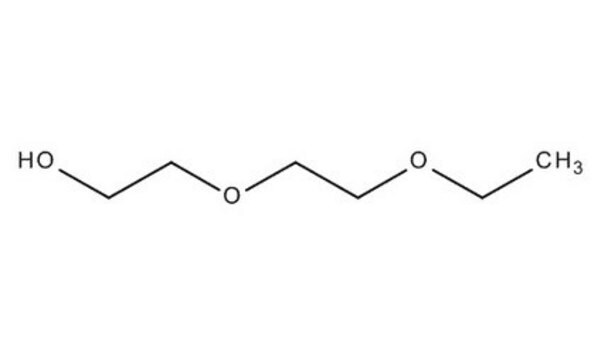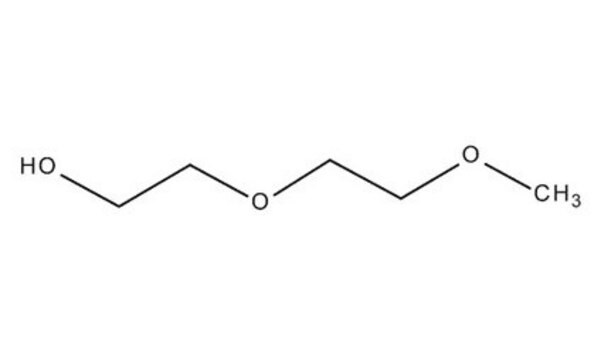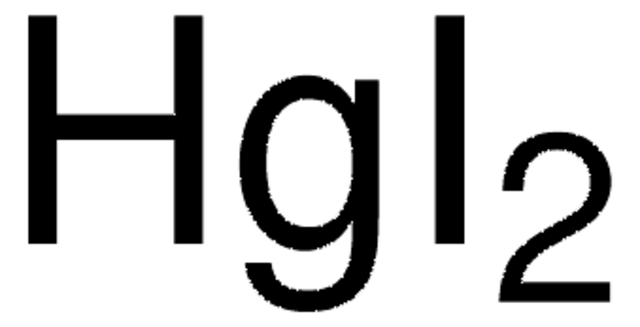8.03129
Diethylene glycol monobutyl ether
for synthesis
Sinónimos:
Diethylene glycol monobutyl ether, Butyl carbitol, 2-(2-Butoxyethoxy)ethanol, Butyl diglycol
About This Item
Productos recomendados
presión de vapor
<1 hPa ( 20 °C)
Nivel de calidad
Análisis
≥98% (GC)
formulario
liquid
temp. de autoignición
210 °C
potencia
5660 mg/kg LD50, oral (Rat)
4120 mg/kg LD50, skin (Rabbit)
lim. expl.
0.7-5.9 % (v/v)
pH
7 (20 °C)
kinematic viscosity
6.1 cSt(20 °C)
bp
226-234 °C/1013 hPa
mp
-68 °C
temperatura de transición
flash point 105 °C
densidad
0.95 g/cm3 at 20 °C
temp. de almacenamiento
2-30°C
InChI
1S/C8H18O3/c1-2-3-5-10-7-8-11-6-4-9/h9H,2-8H2,1H3
Clave InChI
OAYXUHPQHDHDDZ-UHFFFAOYSA-N
Categorías relacionadas
Aplicación
- Biopolymeric Anticorrosion Coatings from Cellulose Nanofibrils and Colloidal Lignin Particles.: This study describes the development of a novel anticorrosion coating made from biopolymers, including a discussion on the use of diethylene glycol monobutyl ether as a solvent to disperse components uniformly (Dastpak et al., 2021).
- The investigation of structural and thermosensitive properties of new phosphazene derivatives bearing glycol and amino acid.: This research article explores the properties of phosphazene derivatives that incorporate glycol structures, detailing methods like NMR and IR spectroscopy where diethylene glycol monobutyl ether may be employed as a solvent in the synthesis process (Uslu and Güvenaltın, 2010).
- Diethylene glycol mono butyl ether concentrations in room air from application of cleaner formulations to hard surfaces.: This study measures the air concentrations of diethylene glycol monobutyl ether in indoor environments following its application in cleaning agents, demonstrating its volatility and potential inhalation exposure during use (Gibson et al., 1991).
Nota de análisis
Density (d 20 °C/ 4 °C): 0.951 - 0.954
Water (K. F.): ≤ 0.20 %
Peroxide (as H₂O₂): ≤ 0.05 %
Identity (IR): passes test
Palabra de señalización
Warning
Frases de peligro
Consejos de prudencia
Clasificaciones de peligro
Eye Irrit. 2
Código de clase de almacenamiento
10 - Combustible liquids
Clase de riesgo para el agua (WGK)
WGK 1
Punto de inflamabilidad (°F)
210.2 °F - closed cup
Punto de inflamabilidad (°C)
99 °C - closed cup
Certificados de análisis (COA)
Busque Certificados de análisis (COA) introduciendo el número de lote del producto. Los números de lote se encuentran en la etiqueta del producto después de las palabras «Lot» o «Batch»
¿Ya tiene este producto?
Encuentre la documentación para los productos que ha comprado recientemente en la Biblioteca de documentos.
Los clientes también vieron
Nuestro equipo de científicos tiene experiencia en todas las áreas de investigación: Ciencias de la vida, Ciencia de los materiales, Síntesis química, Cromatografía, Analítica y muchas otras.
Póngase en contacto con el Servicio técnico













